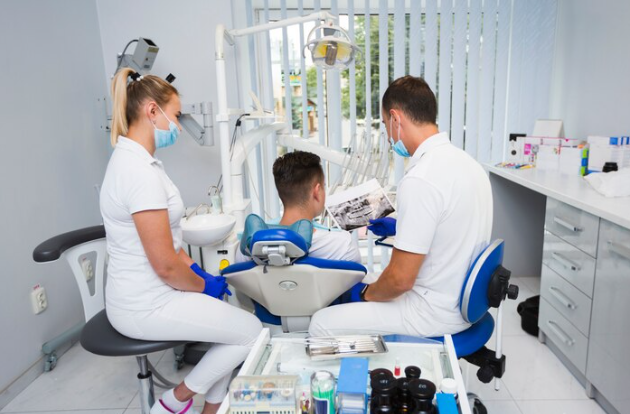
Dental Care for Special Needs Patients: Ensuring Comfort and Accessibility
Dental care is an essential aspect of overall health and well-being, yet it can be challenging for individuals with special needs to receive the necessary treatment. Special needs patients may require unique accommodations, support, and understanding during dental visits to ensure their comfort and accessibility.
In this blog post, we will discuss the importance of special oral care and how it can be effectively provided to patients with special needs. We’ll also explore the role of a recognized dental specialty that deals specifically with treating diseases of the tissues around the teeth.
What type of patient needs special mouth care?
Special needs patients refer to individuals who have physical, developmental, or cognitive disabilities, limiting their ability to perform daily activities independently. These include but are not limited to individuals with Down syndrome, cerebral palsy, autism spectrum disorder, intellectual disabilities, and spinal cord injuries.
Such patients may face challenges in maintaining proper oral hygiene due to physical limitations or difficulties with motor skills. As a result, they may be at a higher risk of developing dental diseases such as tooth decay and gum disease.
What is the purpose of special oral care?
The purpose of special oral care is to ensure that individuals with disabilities can maintain good oral health and receive necessary dental treatment without any barriers. It involves providing individualized care and making accommodations to meet the unique needs of each patient. This care is essential as poor oral hygiene can lead to serious health issues, including infections, chronic pain, malnutrition, and even hospitalization.
How do you support a patient during dental treatment?
Dental visits can be challenging for special needs patients, often causing anxiety and fear. As dental professionals, it is important to create a supportive and comfortable environment for these patients. Here are some ways in which we can support them during treatment:
- Communication: Effective communication is crucial when treating special needs patients. Dentists should take the time to understand their patient’s unique needs and communicate in a way that they can understand. This may involve using visual aids, simplified language, or even non-verbal communication.
- Accommodations: Making physical accommodations can make a significant difference for special needs patients. This may include providing wheelchair accessibility, adjusting treatment chairs to accommodate different body positions, or using specialized tools for patients with limited mobility.
- Distraction techniques: Utilizing distraction techniques can help alleviate anxiety and fear during dental treatment. This can include playing calming music, using virtual reality headsets, or having a designated support person in the room.
- Sensory sensitivities: Many special needs patients may have sensory sensitivities, which can make dental visits overwhelming. Dentists should be aware of these sensitivities and make adjustments as needed. For example, dimming the lights or reducing noise levels can help create a more comfortable environment.
- Collaborating with caregivers: In some cases, special needs patients may require assistance from their caregivers during dental treatment. Dentists should work closely with caregivers to understand their patient’s needs and provide necessary support.
What is the ADA recognized dental specialty that deals with the treatment of diseases of the tissues around the teeth?
Following our discourse on strategies to assist patients with special requirements throughout their dental treatment, we shall now explore the ADA-recognized dental specialty concerned with the management of conditions affecting the tissues encompassing the teeth.
The medical term for this field is periodontics. Periodontology is “the branch of dentistry concerned with the diagnosis, prevention, and treatment of diseases affecting the gums and supporting structures of the teeth,” as defined by the American Academy of Periodontology.
Periodontists are specialists in the treatment of conditions that significantly affect an individual’s oral health, such as periodontal disease. Additionally, they are experts in procedures including crown lengthening, gingival grafts, and dental implants.
Patients with special needs may have an increased susceptibility to periodontal disease as a result of various factors, including challenges related to mobility and communication, adverse effects of medications, and pre-existing medical conditions. Therefore, including a periodontist on the dental care team can be essential for assuring these patients’ oral health.
Dental care for special needs patients requires a unique approach to ensure comfort and accessibility. As dentists, it is our responsibility to understand and support the specific needs of these patients. By implementing the tips and strategies discussed in this blog, we can provide quality dental care that is tailored to the individual needs of special needs patients.
Remember, every patient deserves a healthy and happy smile, regardless of their abilities or challenges. Let’s continue to strive for inclusive and comprehensive dental care for all. So next time you come across a special needs patient, don’t hesitate to go the extra mile to make their dental experience a positive one.
Let’s all work together to ensure that every patient receives the best possible oral care and maintains good oral health for years to come. Let’s make sure that no one is left behind when it comes to dental care and strive towards inclusive dentistry.”
Our Commitment at Gentle Touch Family Dentistry
At Gentle Touch Family Dentistry, our goal is to ensure that every patient feels valued, respected, and comfortable. We firmly believe that dental care is not a luxury, but a basic right that should be accessible to everyone, including those with special needs.
Our team of dedicated professionals is well-versed in the complexities of special needs dentistry and are committed to tailoring treatments that cater to the unique needs of these patients. We continually strive for innovation in inclusivity, ensuring that our dental practice is a safe and welcoming space for all.
Remember, maintaining oral health is a crucial part of overall well-being. We encourage everyone to take this journey with us – whether you are a caregiver, a patient, or an individual keen to learn more. Join us in promoting inclusive dental care practices.
Do you have a loved one who requires special needs dentistry? Don’t hesitate to reach out to us. Schedule an appointment today with Gentle Touch Family Dentistry. Let’s work together towards a healthier smile because everyone deserves to smile with confidence.



